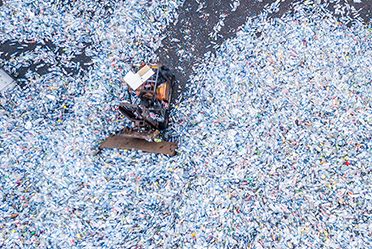Recycling and waste management sector sets out detailed plan to cut 8% of UK total greenhouse gas emissions to net zero by 2040
Environmental Services Association members to invest £10bn and create 40,000 new jobs over the next decade to deliver this goal
Goal requires more clarity on the regulatory and policy context for carbon capture technology and greater access to renewable energy sources.
Success in reaching net zero equivalent to taking 7 million cars off British roads
The UK recycling and waste management sector committed to meeting a challenging Net Zero emissions target a decade ahead of the Government’s own deadline, in a statement published on June 30.
The recycling and waste management sector has reduced its GHG emissions by 46% since 1990. To go further and faster and deliver its 2040 target, the ESA said its members will:
- Invest £10bn of new money in recycling infrastructure to drive up recycling rates and cut down waste; and increasing capture of methane emissions, the most potent form, by 85% from landfill by 2030
- Decarbonise non-recyclable waste treatment by diverting organic waste from landfill to recycling and energy production by 2030, and moving removing plastics from energy
- recovery facilities; and roll out carbon capture technology across our energy from waste facilities by 2040 where feasible
- Buy only zero emissions collection vehicles from 2030, phasing out petrol and diesel entirely by 2040. Move vehicle and all on-site fuel use to zero emissions sources by 2040, so that bin and recycling lorries and trucks across the country are powered by sustainable sources such as electric or biofuel rather than diesel
Gavin Graveson, Chairman of the Environmental Services Association, said: “Our sector has made tremendous and rapid progress on decarbonisation, but the climate crisis continues to accelerate and our sector is determined to embrace the challenge by doing more to ensure we hit net zero. Our report also shows that done right, decarbonisation can deliver green jobs and investment right across the UK.”
Jacob Hayler, Executive Director of the ESA, said: “Our members have committed to an ambitious target and we have developed a clear and detailed plan to get there. This is an urgent and important task for the UK which we are excited, willing and able to invest behind. Critical to our success is a continuing constrictive partnership with Government to ensure the policy framework around decarbonisation continues to drive the right decisions which will ensure we can accelerate the UK’s net zero ambition.”
George Eustice, Secretary of State for Environment, Food and Rural Affairs, said: “The ESA’s commitment today is absolutely vital in helping us achieve our world-leading target of net zero greenhouse gas emissions by 2050, building a net zero economy and leaving the environment in a better state for future generations.
“The recycling and waste management sectors are key to the success of our reforms, from creating deposit return schemes for drinks containers to encouraging more recyclable packaging. This commitment will help the nation transform the way we deal with waste and reduce our emissions.”
The ESA’s Board will be responsible for monitoring performance against the targets set and will review and report on progress against this strategy annually, and the strategy itself every five years, to ensure that it remains aligned with policy and market shifts.
A full GHG review for the sector will be conducted every two years and will be published in the ESA’s Annual Report, baselined against the first sectorwide emissions review conducted this year by Ricardo.
In addition to delivery from the ESA and its members, success will also require government support on energy decarbonisation and carbon capture to ensure maximum benefit for the UK. The ESA will continue to work in close partnership with government on two critical policy areas.
The first is the regulatory and policy context around carbon capture technology, which helps reduce emissions from non-recyclable waste and removes carbon dioxide from the atmosphere. The second is around decarbonisation of industrial vehicles such as collection wagons through the progressive electrification and deployment of renewable and alternative fuels.
The Environmental Services Association is the member organisation for essential waste treatment and recycling service companies in the UK covering collection, sorting, landfill and energy from waste. The sector employs 123,000 people across 92 companies.
While it is an essential public service, waste management is a significant part of the UK’s overall GHG emissions; the UK produces 221m tonnes of rubbish a year and the waste management process generates 8% of the UK’s total emissions.
The ESA’s activity is governed by the waste hierarchy, designed to promote reuse and repair, then recycling and energy recovery, to minimise the amount of waste which goes to landfill and promote a more circular economy.
In 2018, this resulted in 50m tonnes of avoided CO2e emissions across the UK by preventing waste from reaching landfill, and in 2019, UK waste management facilities generated around 9% of the UK’s renewable energy.



